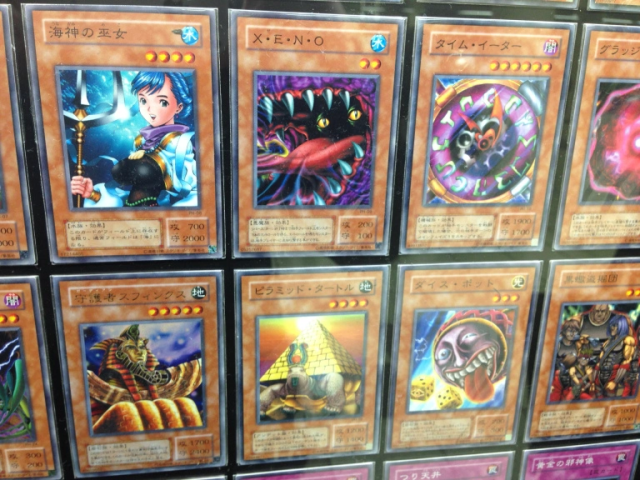
Woman who bought the card noticed coloring flaw, setting off hunt for culprit that ended halfway across Japan.
This week, investigators from the Kyoto Prefectural Police’s Shimogamo Precinct cracked a counterfeiting case, nabbing their man halfway across the country. On October 23, Shunki Iwasaki, a 29-year-old resident of Tokyo’s Setagaya Ward, was placed under arrest and now stands to face a variety of charges.
The arrest comes eight months after Iwasaki passed off the counterfeit items as the real thing something he admits to doing. However, he wasn’t dealing in illicit duplicates of classic art, paper currency, or any of the other wares often involved in counterfeiting crimes. No, Iwasaki was trying to get a quick score by selling a counterfeit Yu-Gi-Oh! card.
It wasn’t just any Yu-Gi-Oh! card, either. In mid-February, Iwasaki posted a listing on Yahoo! Auctions, one of Japan’s most popular online marketplaces, where he said he was selling a Lorelei, the Symphonic Arsenal card. Lorelei was never available in commercially sold packs of Yu-Gi-Oh! cards, being instead given to winners of the 2008 Yu-Gi-Oh! World Championship tournament, and investigators say there are only six genuine examples in the whole world.
▼ A legitimate Lorelei
遊戯王■音響兵器ローレライ■Lorelei, the Symphonic Arsenal世界大会準優勝カード世界6枚■未開封クリスタル入り英語版WCS2008ドイツ大会
— ボンコツ@ (@humina20) April 10, 2018
特殊クリスタル入り https://t.co/vAJX77LgSk pic.twitter.com/UzParUDuk5
A 20-something woman living in Kyoto purchased Iwasaki’s card, rendering payment to him of 400,000 yen (US$3,570). However, after receiving the card, the woman noticed that the background in the illustration was much more colorful than it should be, with a rainbow-like array of hues. She then went to the police who were able to track Iwasaki down.
However, while Iwasaki admits that he “figured the card was probably a fake,” he didn’t make the imitation Lorelei, and so the Kyoto Prefectural Police are currently looking into the avenue by which Iwasaki obtained the card in hopes of bringing the counterfeiter himself to justice as well.
Still, Iwasaki’s actions were enough to get him arrested, with the initial charges filed being copyright infringement ones, since the card bore the name and logo of Yu-Gi-Oh! parent company Konami. Investigators are also determining whether or not fraud charges are applicable, though they seem incredibly likely, considering that the hefty priced the woman paid for the piece of paper was entirely dependent upon the assumption that it was a genuine, official card,
It’s unclear whether or not Iwasaki still has the woman’s money, and by extension whether or not she’s going to get it back. However, considering that some Yu-Gi-Oh! cards have been offered for sale for as much as 45 million yen, even if the money she gave Iwasaki is gone forever, things could have been far worse. For all the rest of us, the incident serves as an important reminder of the importance of verifying the authenticity of collector’s items before completing the transaction, and if you can’t, you might be better off sticking with admiring rare Yu-Gi-Oh! items the next time every card from the franchise gets displayed together.
Sources: Yahoo! Japan News/MBS via Otakomu, Jiji, FBS
Top image ©SoraNews24
Follow Casey on Twitter, where he still hasn’t been able to find those Ani-Mayhem cards e lost 20 years ago.

 Japanese woman seeks justice after buying four million-dollar bills from counterfeiters
Japanese woman seeks justice after buying four million-dollar bills from counterfeiters Tokyo police arrest two men for theft of 4.98 million-yen Yu-Gi-Oh! card
Tokyo police arrest two men for theft of 4.98 million-yen Yu-Gi-Oh! card Every Yu-Gi-Oh! card ever, all in one place at awesome Tokyo train station display 【Photos】
Every Yu-Gi-Oh! card ever, all in one place at awesome Tokyo train station display 【Photos】 Mother and son in Japan busted by Ota-ku police for running counterfeit Pokémon operation
Mother and son in Japan busted by Ota-ku police for running counterfeit Pokémon operation Behold the most realistic miso soup novelty smartphone stand known to man
Behold the most realistic miso soup novelty smartphone stand known to man How to order snacks on a Shinkansen bullet train in Japan
How to order snacks on a Shinkansen bullet train in Japan Burger King Japan suddenly adds Dr. Pepper and Dr. Pepper floats to its menu nationwide
Burger King Japan suddenly adds Dr. Pepper and Dr. Pepper floats to its menu nationwide New Nintendo Lego kit is a beautiful piece of moving pixel art of Mario and Yoshi【Photos】
New Nintendo Lego kit is a beautiful piece of moving pixel art of Mario and Yoshi【Photos】 Hello, cosmetics! Clinique teams up with Hello Kitty this summer for first-time collaboration
Hello, cosmetics! Clinique teams up with Hello Kitty this summer for first-time collaboration Demon Slayer: Kimetsu no Yaiba gets new roller coaster attractions and food at Universal Studios Japan
Demon Slayer: Kimetsu no Yaiba gets new roller coaster attractions and food at Universal Studios Japan 11 different ways to say “father” in Japanese
11 different ways to say “father” in Japanese Kyoto tea merchant’s matcha parfait ice cream bars: The desserts we’ve been waiting 187 years for
Kyoto tea merchant’s matcha parfait ice cream bars: The desserts we’ve been waiting 187 years for East meets West in the Pacific-centered version of the world map
East meets West in the Pacific-centered version of the world map What do you eat when you catch a cold? We asked 11 of our Japanese reporters
What do you eat when you catch a cold? We asked 11 of our Japanese reporters Shinjuku izakaya’s all-you-can-eat-and-drink plan is one of Tokyo’s best secret cheap eats
Shinjuku izakaya’s all-you-can-eat-and-drink plan is one of Tokyo’s best secret cheap eats Nintendo history you can feel – Super NES, N64, and GameCube controllers become capsule toys
Nintendo history you can feel – Super NES, N64, and GameCube controllers become capsule toys “The most Delicious Cup Noodle in history” – Japan’s French Cup Noodle wins our heart【Taste test】
“The most Delicious Cup Noodle in history” – Japan’s French Cup Noodle wins our heart【Taste test】 Starbucks releases a cute Frappuccino and Unicorn Cake…but not in Japan
Starbucks releases a cute Frappuccino and Unicorn Cake…but not in Japan Kyoto Tower mascot termination reveals dark side behind cute Japanese characters
Kyoto Tower mascot termination reveals dark side behind cute Japanese characters McDonald’s Japan’s Soft Twist Tower: A phantom ice cream only sold at select branches
McDonald’s Japan’s Soft Twist Tower: A phantom ice cream only sold at select branches Yabai Ramen: What makes this Japanese ramen so dangerous?
Yabai Ramen: What makes this Japanese ramen so dangerous? Finally! Nintendo Japan expands Switch 8-bit controller sales to everybody, Online member or not
Finally! Nintendo Japan expands Switch 8-bit controller sales to everybody, Online member or not Japanese government wants to build luxury resorts in all national parks for foreign tourists
Japanese government wants to build luxury resorts in all national parks for foreign tourists To combat declining birth rate, Japan to begin offering “Breeding Visas” to foreigners
To combat declining birth rate, Japan to begin offering “Breeding Visas” to foreigners 10 things you should buy at 7-Eleven in Japan
10 things you should buy at 7-Eleven in Japan Studio Ghibli releases anime heroine cosplay dresses that are super comfy to wear
Studio Ghibli releases anime heroine cosplay dresses that are super comfy to wear Woman charged for driving suitcase without a license in Osaka
Woman charged for driving suitcase without a license in Osaka Studio Ghibli unveils My Neighbour Totoro miniature house model
Studio Ghibli unveils My Neighbour Totoro miniature house model Kyoto experiencing problems with foreign tourists not paying for bus fares, but not on purpose
Kyoto experiencing problems with foreign tourists not paying for bus fares, but not on purpose Fighting mild hunger with a Japanese soda that turns into jelly in the stomach【Taste test】
Fighting mild hunger with a Japanese soda that turns into jelly in the stomach【Taste test】 Studio Ghibli’s Howl’s Moving Castle tapestry unveiled in Japan for first time
Studio Ghibli’s Howl’s Moving Castle tapestry unveiled in Japan for first time McDonald’s new Happy Meals offer up cute and practical Sanrio lifestyle goods
McDonald’s new Happy Meals offer up cute and practical Sanrio lifestyle goods Sales of Japan’s most convenient train ticket/shopping payment cards suspended indefinitely
Sales of Japan’s most convenient train ticket/shopping payment cards suspended indefinitely Sold-out Studio Ghibli desktop humidifiers are back so Totoro can help you through the dry season
Sold-out Studio Ghibli desktop humidifiers are back so Totoro can help you through the dry season Japanese government to make first change to romanization spelling rules since the 1950s
Japanese government to make first change to romanization spelling rules since the 1950s Foreigner’s request for help in Tokyo makes us sad for the state of society
Foreigner’s request for help in Tokyo makes us sad for the state of society Ghibli founders Toshio Suzuki and Hayao Miyazaki contribute to Japanese whisky Totoro label design
Ghibli founders Toshio Suzuki and Hayao Miyazaki contribute to Japanese whisky Totoro label design Doraemon found buried at sea as scene from 1993 anime becomes real life【Photos】
Doraemon found buried at sea as scene from 1993 anime becomes real life【Photos】 Tokyo’s most famous Starbucks is closed
Tokyo’s most famous Starbucks is closed Princesses, fruits, and blacksmiths: Study reveals the 30 most unusual family names in Japan
Princesses, fruits, and blacksmiths: Study reveals the 30 most unusual family names in Japan Chinese criminal’s Yu-Gi-Oh card reaches astronomical price before auction is shut down
Chinese criminal’s Yu-Gi-Oh card reaches astronomical price before auction is shut down Foreign student/cosplayer arrested in Tokyo for having fake Self-Defense Forces ID
Foreign student/cosplayer arrested in Tokyo for having fake Self-Defense Forces ID Five Chinese nationals arrested in Japan for translating manga, games for distribution
Five Chinese nationals arrested in Japan for translating manga, games for distribution Man climbs down side of building in Tokyo to steal…a bunch of Pokémon and Yu-Gi-Oh! cards
Man climbs down side of building in Tokyo to steal…a bunch of Pokémon and Yu-Gi-Oh! cards Yu-Gi-Oh! brings anime battles into real-life with amazing fan-made dueling arena【Video】
Yu-Gi-Oh! brings anime battles into real-life with amazing fan-made dueling arena【Video】 Japanese police file charges against illegal anime girl huggy pillow cover seller
Japanese police file charges against illegal anime girl huggy pillow cover seller Real-life Team Rocket? Pokémon popsicle fraud gets man arrested in Japan
Real-life Team Rocket? Pokémon popsicle fraud gets man arrested in Japan Real-life heart of the cards? Amazing Yu-Gi-Oh! hand floats up to man in Japanese river【Pics】
Real-life heart of the cards? Amazing Yu-Gi-Oh! hand floats up to man in Japanese river【Pics】 Yu-Gi-Oh! collector parts with ultra-rare cards worth more than $5,000 each, for his daughter
Yu-Gi-Oh! collector parts with ultra-rare cards worth more than $5,000 each, for his daughter 23-year-old Tokyo policewoman falls in movie-style love with yakuza member, real life ensues
23-year-old Tokyo policewoman falls in movie-style love with yakuza member, real life ensues Yu-Gi-Oh! Millennium Puzzle forged from pure solid gold to go on display
Yu-Gi-Oh! Millennium Puzzle forged from pure solid gold to go on display Osaka woman gives foreigner Uber Eats worker fake money, thought he wouldn’t know difference
Osaka woman gives foreigner Uber Eats worker fake money, thought he wouldn’t know difference How to rob an idol singer otaku: Look up the birthday of his favorite idol
How to rob an idol singer otaku: Look up the birthday of his favorite idol Power up with this positively scrumptious kakuni braised pork Pac-Man manju from Nagasaki
Power up with this positively scrumptious kakuni braised pork Pac-Man manju from Nagasaki How to spot the new sophisticated counterfeit bills circulating in Japan
How to spot the new sophisticated counterfeit bills circulating in Japan
Leave a Reply